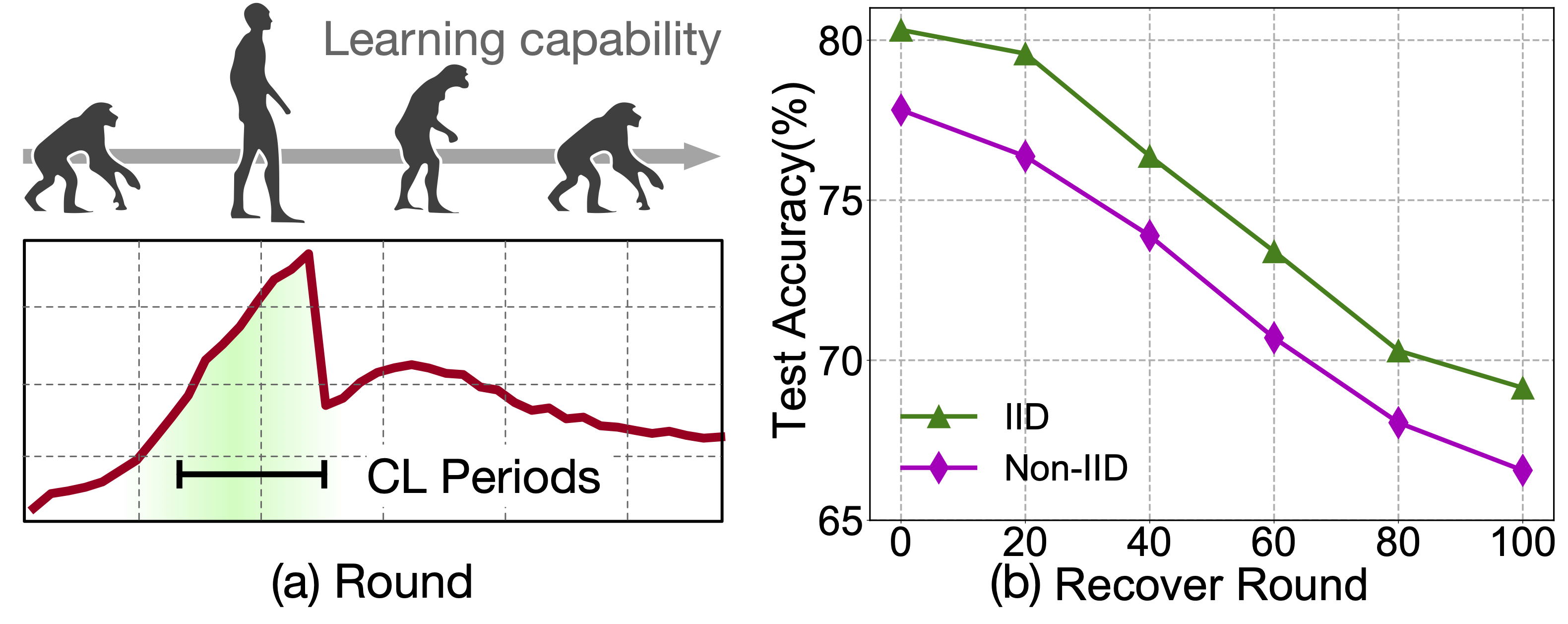Critical Learning Periods

Seizing Critical Learning Periods in Federated Learning
——Accepted by the AAAI 2022, [PDF], [Code]
Abstract
Federated learning (FL) is a popular technique to train machine learning (ML) models with decentralized data. Extensive works have studied the performance of the global model; however, it is still unclear how the training process affects the final test accuracy. Exacerbating this problem is the fact that FL executions differ significantly from traditional ML with heterogeneous data characteristics across clients, involving more hyperparameters. In this work, we show that the final test accuracy of FL is dramatically affected by the early phase of the training process, i.e., FL exhibits critical learning periods, in which small gradient errors can have irrecoverable impact on the final test accuracy. To further explain this phenomenon, we generalize the trace of the Fisher Information Matrix (FIM) to FL and define a new notion called FedFIM, a quantity reflecting the local curvature of each clients from the beginning of the training in FL. Our findings suggest that the initial learning phase plays a critical role in understanding the FL performance. This is in contrast to many existing works which generally do not connect the final accuracy of FL to the early phase training. Finally, seizing critical learning periods in FL is of independent interest and could be useful for other problems such as the choices of hyperparameters such as the number of client selected per round, batch size, and more, so as to improve the performance of FL training and testing.
DeFL: Defending Against Model Poisoning Attacks in Federated Learning via Critical Learning Periods Awareness
——Accepted by the AAAI 2023, [PDF], [Code]
Abstract
Federated learning (FL) is known to be susceptible to model poisoning attacks in which malicious clients hamper the accuracy of the global model by sending manipulated model updates to the central server during the FL training process. Existing defenses mainly focus on Byzantine-robust FL aggregations, and largely ignore the impact of the underlying deep neural network (DNN) that is used to FL training. Inspired by recent findings on critical learning periods (CLP) in DNNs, where small gradient errors have irrecoverable impact on the final model accuracy, we propose a new defense, called a CLP-aware defense against poisoning of FL (DeFL). The key idea of DeFL is to measure fine-grained differences between DNN model updates via an easy-to-compute federated gradient norm vector (FGNV) metric. Using FGNV, DeFL simultaneously detects malicious clients and identifies CLP, which in turn is leveraged to guide the adaptive removal of detected malicious clients from aggregation. As a result, DeFL not only mitigates model poisoning attacks on the global model but also is robust to detection errors. Our extensive experiments on three benchmark datasets demonstrate that DeFL produces significant performance gain over conventional defenses against state-of-the-art model poisoning attacks.
CriticalFL: A Critical Learning Periods Augmented Client Selection Framework for Efficient Federated Learning
——Accepted by the KDD 2023, [PDF], [Code]
Abstract
Federated learning (FL) is a distributed optimization paradigm that learns from data samples distributed across a number of clients. Adaptive client selection that is cognizant of the training progress of clients has become a major trend to improve FL efficiency but not yet well-understood. Most existing FL methods such as FedAvg and its state-of-the-art variants implicitly assume that all learning phases during the FL training process are equally important. Unfortunately, this assumption has been revealed to be invalid due to recent findings on critical learning periods (CLP), in which small gradient errors may lead to an irrecoverable deficiency on final test accuracy. In this paper, we develop CriticalFL, a CLP augmented FL framework to reveal that adaptively augmenting exiting FL methods with CLP, the resultant performance is significantly improved when the client selection is guided by the discovered CLP. Experiments based on various machine learning models and datasets validate that the proposed CriticalFL framework consistently achieves an improved model accuracy while maintains better communication efficiency as compared to state-of-the-art methods, demonstrating a promising and easily adopted method for tackling the heterogeneity of FL training.
Enhancing Model Poisoning Attacks to Byzantine-Robust Federated Learning via Critical Learning Periods
——Accepted by the RAID 2024
Abstract
Most existing model poisoning attacks in federated learning (FL) control a set of malicious clients and share a fixed number of malicious gradients with the server in each FL training round, to achieve a desired tradeoff between the attack impact and the attack budget. In this paper, we show that such a tradeoff is not fundamental and an adaptive attack budget not only improves the impact of attack \(\mathcal{A}\) but also makes it more resilient to defenses. However, adaptively determining the number of malicious clients that share malicious gradients with the central server in each FL training round has been less investigated. This is due to the fact that most existing model poisoning attacks mainly focus on FL optimization itself to maximize the damage to the global model, and largely ignore the impact of the underlying deep neural networks that are used to train FL models. First, inspired by recent findings on critical learning periods (CLP), where small gradient errors have irrecoverable impact on model accuracy, we advocate CLP augmented model poisoning attacks \(\mathcal{A}\)-CLP in this paper. \(\mathcal{A}\)-CLP merely augments an existing model poisoning attack \(\mathcal{A}\) with an adaptive attack budget scheme and hence is orthogonal to \(\mathcal{A}\). Specifically, \(\mathcal{A}\)-CLP inspects the changes in federated gradient norms to identify CLP and adaptively adjusts the number of malicious clients that share their malicious gradients with the server in each FL training round, leading to dramatically improved attack impact compared to \(\mathcal{A}\) by up to 6.85\(\times\), with a smaller attack budget. This in turn improves the resilience of \(\mathcal{A}\) by up to 2\(\times\). Second, since \(\mathcal{A}\)-CLP is orthogonal to the attack \(\mathcal{A}\), it also crafts malicious gradients by solving a difficult optimization problem. To tackle this challenge and based on our understandings of \(\mathcal{A}\)-CLP, we further relax the inner attack subroutine \(\mathcal{A}\) in \(\mathcal{A}\)-CLP and design GraSP, a lightweight CLP augmented similarity-based attack. We show that GraSP not only is more flexible but also achieves an improved attack impact compared to the strongest of existing model poisoning attacks.
